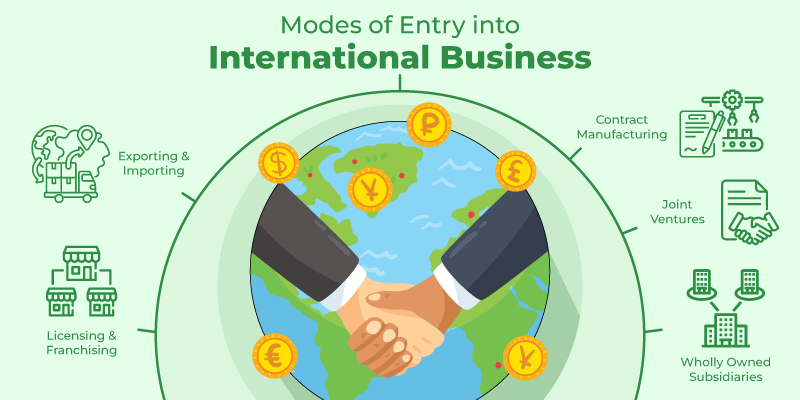Advantages and Disadvantages of International BusinessInternational Business cuts across all the commercial activities that promote the transfer of goods, services, ideas, technologies, and resources across national boundaries. It must be noted here that people assume that International Business is International Trade. However, this is incorrect. There is no confusion that International Trade consists of exports and imports of goods and services and has been an important factor in International Business. The definition of international Business has become more inclusive now, including international tourism and travel, banking, warehousing, banking and communication, transportation, advertising, and distribution. In conclusion, we can say that International Business is an umbrella term and consists of both the production and trade of goods and services across sectors. 
Reasons for International BusinessOne of the principal reasons for International Business is that all nations cannot produce goods equally and cheaply. It is primarily due to the uneven distribution of natural resources and the capacity to produce goods. Factors like raw materials, capital, labor, infrastructure, investment, and technology widely differ among the countries. Factors affecting labor productivity could be geographical, political, and socio-economic. Owing to these differences, it is not easy for countries to produce quality and cheap goods. However, some countries are placed in favorable positions that can produce cheap and quality products. This has forced other countries to engage in trade and what we refer to as International Business. International Business and Domestic BusinessInternational Business is more complex compared to Domestic Business. It is due to the nation's social, political, and economic environment. Domestic Business houses find extending their operations in a different country difficult. To succeed in international business operations, they need to adapt their product, pricing, promotion, and distribution strategies and transform their business plan to match the specific requirement of the respective foreign market. Differences Between International Business and Domestic Business
Benefits of International Business
International business activity helps immensely boost its foreign reserve, and it helps in meeting the needs like pharmaceuticals items, technology, petroleum, capital goods, technology, and other goods which might be unavailable in the domestic market.
One simple principle is followed in International Business: produce the goods more efficiently and those produced in surplus trade with other nations.
Production for just domestic needs restricts the growth of the nations and employment opportunities. This problem has been observed in developing nations, and there are not enough markets to consume the surplus product, but countries like China, South Korea, and Singapore moved ahead with the strategy of "trade and flourish," and soon they emerged as one of the world's most powerful economies. These countries with surplus exports have boosted their growth prospects and have created millions of employment opportunities.
Those countries that are surplus in trade have witnessed high standards of living due to increased income and growth. Their economy consumes more due to readily available goods present in the country. Benefits to the Firms
Businesses could be more profitable to the business firms when the prices of the goods are lower in the domestic market; they can easily sell their products in the international market where the price is high.
It becomes frustrating for enterprises when the demands for their products start saturating the domestic market, and they try to capture the international market. This is what Multinational companies of the developed economies have done. They have entered into the market of developing economies and realized that their product is in demand.
Many multinational firms have a surplus production unit capacity, and by planning overseas expansion and procuring orders from foreign countries, they can enhance their production scale capacity. This would, in turn, lower the production cost, and the profit margin would be maximum.
Intense competition in the domestic market becomes the driving force for companies to search for the international market to sell their products. When there is a tight competition in the domestic market, internationalization seems to be the perfect solution. It becomes the only way to attain growth. Modes of Entry into the International BusinessHere the word mode means the different ways the companies enter international Business. Some of the ways that companies adopt to enter the international businesses are:
Exporting and Importing
Contract ManufacturingIt is referred to as a type of international business market activity in which an enterprise agrees with one or a few domestic manufacturers in foreign countries to get some components or goods produced per its specifications. Sometimes, contract manufacturing is called outsourcing, and it can assume three forms:
Licensing and FranchisingLicensing is an agreement on a contract basis in which one enterprise gives permission to its technology, trade secrets, and patents to another foreign enterprise for a charge called royalty. The enterprise that gives such permission to another enterprise is called a licensor, and the other enterprise that receives such rights to use patents and technology is called a licensee. In some situations, an exchange of technology, patents, and knowledge occurs between the two enterprises, called cross-licensing. The Franchising term is very similar to licensing. One main difference is that licensing is used in the production and marketing sense. Advantages of International Business
Disadvantages of International Businesses
|
 For Videos Join Our Youtube Channel: Join Now
For Videos Join Our Youtube Channel: Join Now
Feedback
- Send your Feedback to [email protected]
Help Others, Please Share










